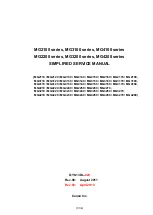
--------------
THERMAL RECEIPT PRINTER-
------------
26
x0 = [( xL + xH
×
256)
×
(horizontal motion unit)]
y0 = [( yL + yH
×
256)
×
(vertical motion unit)]
dx = [ dxL + dxH
×
256]
×
(horizontal motion unit)]
dy = [ dyL + dyH
×
256]
×
(vertical motion unit)]
The printing area is set as shown in the figure below.
[Details]
•
If this command is input in standard mode, the printer executes only internal
flag operation. This command does not affect printing in standard mode.
•
If the horizontal or vertical starting position is set outside the printable area, the
printer stops command processing and processes the following data as normal
data.
•
If the printing area width or height is set to 0, the printer stops command
processing and processes the following data as normal data.
•
This command sets the position where data is buffered to the position specified
by
ESC T
within the printing area.
•
If (horizontal starting po printing area width) exceeds the printable area,
the printing area width is automatically set to (horizontal printable area -
horizontal starting position).
•
If (vertical starting po printing area height) exceeds the printable area,
the printing area height is automatically set to (vertical printable area - vertical
starting position).
•
The horizontal and vertical motion unit are specified by
GS P
. Changing the
horizontal or vertical motion unit does not affect the current printing area.
•
The
GS P
command can change the horizontal (and vertical) motion unit.
However, the value cannot be less than the minimum horizontal movement
amount, and it must be in even units of minimum horizontal movement amount.
•
Use the horizontal motion unit ( x) for setting the horizontal starting position and
printing area width, and use the vertical motion unit ( y) for setting the vertical
starting position and printing area height.
•
When the horizontal starting position , vertical starting position, printing area
width, and printing area height are defined as X, Y, Dx, and Dy respectively, the
printing area is set as shown in the figure below.
















































